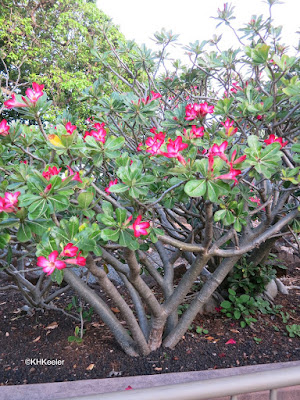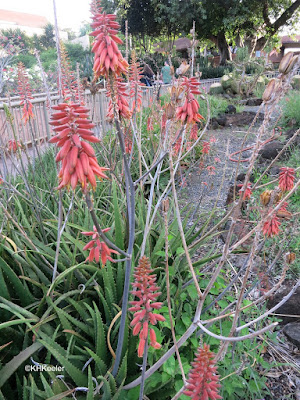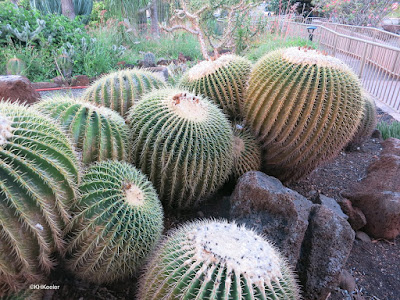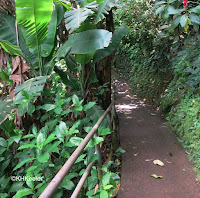A farmer's market gathers each Saturday in Honolulu, just below Kapi'olani Community College. It was fun shopping there: macadamia nuts, kona coffee, guavas, pineapples and chocolates. But I was distracted and spent most of my time in the garden behind the farmer's market, Kapi'olani Community College's Cactus Garden.
Cacti on Oahu? And yet they were magnificent. Cacti are tropical and subtropical. This was a south-facing slope, getting strong sunlight all day and well drained. Nor is all of Hawaii wet. The area of Honolulu alongWaikiki Beach to Diamond Head gets under 20" of rain a year, less than half of New York's rainfall. Kapi'olani Community College is on the edge of that rainfall zone.
Growing there were ten-foot columnar cacti
Vast sprawling cacti, likely octopus cactus, Stenocereus alamosensis
And much more
The iconic Hawaiian plumeria, this one red-pink
 |
| plumeria, genus Plumeria |
 |
| red-hot poker, Kniphofia |
While other areas had been weeded and mulched
I garden. I looked at that transformation and thought, wouldn't it be fun to volunteer here, helping weed so the beautiful big plants are set off like the jewels they are?
 |
| barrel cacti |
Before I got too far into my fantasy, though, I thought a bit about the plants being weeded around--cacti. Oh-oh, spiny! often with perfectly awful tiny hairs (glochids) that stick into your skin. And many of the others, such as agaves and crown-of-thorns, are well-protected with spines or had irritating hairs or poisonous sap. Plants from the dry tropics grow slowly and are well defended against being eaten by animals. So perhaps making this garden shine is for the tough. My rather tame Colorado garden has just one prickly pear cactus that stabs me when I weed around it and roses that grab my sleeves when I walk by, nothing like Kapi'olani's Cactus Garden. I take my hat off to the people who were weeding around the spiny, thorny, toxic plants.
 |
| An attractive agave. Note the "teeth" on the leaves. |
 |
| A Euphorbia, like crown-of-thorns but crown-of-thorns, Euphorbia millii, has salmon-colored flowers. Note the spines and don't get the sap on your skin. |
 |
| Just part of the plant material they had recently removed! |
 |
| Kapiolani Community College Cactus Garden path |
Comments and corrections welcome.
Kathy Keeler, A Wandering Botanist
More at awanderingbotanist.com
Join me on Facebook: https://www.facebook.com/AWanderingBotanist
This is the third of three posts about beautiful places to see plants on the Hawaiian island Oahu
The other two are
Foster Botanical Garden link

and
Wahiawa in the middle of the island link

This is the third of three posts about beautiful places to see plants on the Hawaiian island Oahu
The other two are
Foster Botanical Garden link

and
Wahiawa in the middle of the island link








No comments:
Post a Comment